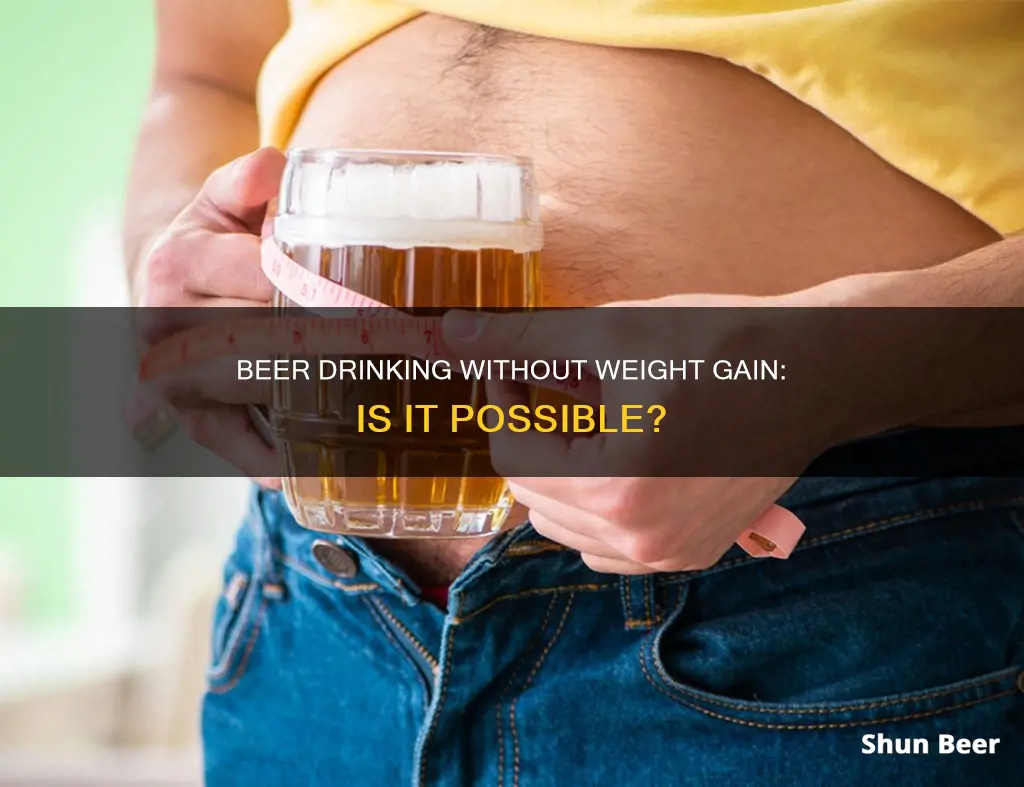
Drinking beer and staying slim is a delicate balance. Alcohol is high in calories and can affect hormones that control appetite, hunger, and stress. It can also impair the function of glands that release hormones, causing weight gain. However, this does not mean you have to give up beer entirely. The key is moderation and making smart choices. Here are some tips to help you enjoy a beer without gaining weight:
1. Avoid binge drinking and eating: Binge drinking can lead to weight gain as the body prioritizes breaking down alcohol over fat, resulting in a beer belly. Similarly, drinking can lead to binge eating, especially when distracted or engaged in conversation. Opt for low-calorie, protein-rich foods like carrot sticks, cucumber sticks, and lean meats instead of fatty snacks.
2. Choose low-calorie beers: Opt for light beers, alcohol-free beers, or low-carb beers, which have fewer calories and won't slow down your metabolism as much.
3. Pick drinks with a higher alcohol-to-calorie ratio: Certain drinks have a higher ratio, such as liquor, red or white wine (especially dry varieties), Champagne, or light beer.
4. Drink water: Alternating between alcoholic drinks and water can help with moderation, prevent dehydration, and slow down your drinking pace.
5. Eat a healthy meal beforehand: A meal with lean protein and good fats before drinking can help slow the absorption of alcohol and reduce the risk of overeating.
6. Exercise and stay active: Maintaining a regular exercise routine and staying active can help offset the calories consumed from drinking and promote a healthy lifestyle.
7. Know your limits: Plan ahead and set a drink limit for yourself before going out. Stick to your commitment and avoid excessive drinking.
| Characteristics | Values |
|---|---|
| Drinking frequency | No more than 14 drinks a week for men, and no more than seven for women |
| Drinking volume | No more than four drinks in a single day for men, and three for women |
| Drinking speed | Drink slowly and steadily |
| Drinking alternatives | Water, non-alcoholic beer, low-calorie drinks, clear spirits with soda water |
| Drinking food | Protein-rich foods, vegetables, low-fat foods |
What You'll Learn

Avoid binge drinking
Binge drinking is defined as consuming five or more drinks in about two hours. It can lead to weight gain, even if done occasionally. Binge drinking once a month for a year can lead to weight gain, and over five years, it can add up to 13 pounds. Binge drinking is associated with a higher risk of obesity and abdominal obesity.
To avoid binge drinking, it is important to drink in moderation. Moderate drinking is defined as having up to four drinks for men and three for women in a day or up to 14 drinks for men and seven drinks for women in a week. Drinking slowly is also key to moderation. It takes the liver at least an hour to process a standard drink, so drinking more slowly gives the body more time to metabolise the alcohol.
Another way to avoid binge drinking is to be mindful of the type of alcoholic drinks consumed. Opting for drinks with a higher alcohol-to-calorie ratio, such as liquor, wine, champagne, or light beer, can help reduce overall calorie intake. Additionally, drinking water before, during, and after consuming alcohol can help with hydration and slow down drinking.
Bartenders and Beer: California's Drinking Laws Explained
You may want to see also

Avoid binge eating
Drinking alcohol can lead to binge eating for a variety of reasons. Alcohol dulls the receptors in your brain, making it harder to notice when you're full. Alcohol also triggers the release of the neurotransmitter dopamine, which makes you feel good, and can lead to a release of the appetite-stimulating hormone, ghrelin. This can result in hyperphagia, or an abnormally increased appetite.
Plan ahead
Before you go out drinking, decide whether you will eat while drinking, and if so, what you will eat. Eating a high-fat snack before drinking can help slow the rate at which alcohol affects you, but be careful not to eat too much, as your body will be less able to utilise fat as fuel.
Choose healthier options
If you do decide to eat while drinking, opt for healthier, protein-rich foods. Good options include carrot sticks, cucumber sticks, asparagus, broccoli, lean cuts of meat, and nuts. These foods will fill you up faster and for longer, reducing your desire to binge on high-calorie, fatty foods.
Drink water
Drinking water along with alcohol can help slow your drinking pace and make you feel fuller.
Avoid peer pressure
If you're drinking with friends, you may feel pressured to eat or drink more than you normally would. Be polite but firm if you need to turn down another drink or food. True friends will accept your decision and not pressure you further.
Manage social anxiety
If you tend to drink to calm your nerves in social situations, try some healthier alternatives, such as slow and steady breathing, focusing on external stimuli, and challenging negative self-talk.
The British Beer Myth: Warm or Cold?
You may want to see also

Drink water before, during, and after
Drinking water before, during, and after consuming beer is an effective way to prevent weight gain. Here are some reasons why:
Prevent Dehydration
Alcohol is a diuretic, which means it increases the amount of water and salt expelled from the body. This can lead to dehydration, which can cause thirst and a false sense of hunger. Drinking water before, during, and after alcohol consumption helps to prevent dehydration and its associated side effects. It is recommended to have a glass of water for each alcoholic drink to maintain hydration and slow down the drinking.
Slow Down Alcohol Consumption
Drinking water alongside alcohol helps to slow down the consumption of alcohol. This is because the water fills the stomach, making you feel fuller and less likely to drink quickly or in large quantities. Slowing down alcohol consumption gives the body more time to metabolize the alcohol, reducing the negative impact on fat burning abilities. It also helps to prevent binge drinking, which can have adverse health effects and contribute to weight gain.
Reduce Calorie Intake
Water acts as a substitute for alcoholic drinks, which often contain a high number of calories. By choosing water, you are reducing your overall calorie intake. This is especially beneficial if you are mindful of your drink portions and can help prevent weight gain. Alternating between alcoholic drinks and water can also help you become accustomed to drinking water, reducing your desire for another alcoholic beverage.
Aid Metabolism and Fat Burning
Water can aid in the metabolism of alcohol and support the body's fat-burning abilities. Alcohol slows down the body's ability to burn fat, as the liver prioritizes breaking down alcohol over fat. By staying hydrated, you support your liver function and overall metabolic processes, helping your body process alcohol more efficiently and potentially reducing the amount of fat stored.
Prevent Hangovers
Drinking water before, during, and after alcohol consumption can help prevent hangovers, which are associated with increased food cravings and poor food choices. A hangover can disrupt your routine and healthy habits, potentially leading to unhealthy eating and further alcohol consumption. Staying hydrated helps to reduce the intensity of hangovers, allowing you to stay on track with your health and fitness goals.
Beer and Rum: A Match Made in Heaven?
You may want to see also

Eat protein-rich foods before drinking
Eating protein-rich foods before drinking is a great way to avoid weight gain when consuming beer. Protein is a satiating macronutrient, meaning it keeps you fuller for longer and reduces the likelihood of binge eating or drinking.
Protein also has a thermic effect, meaning that 20-30% of the calories in protein are used when the body is processing it. This is known as the thermic effect of food (TEF). Eating protein before drinking will help to control blood alcohol levels and reduce the absorption rate of alcohol, as well as increase the elimination rate. A protein-rich meal can cut the potential damage of alcohol in half.
Good sources of protein to eat before drinking include lean cuts of meat, such as grilled chicken, turkey, and tuna. These foods will help you feel satisfied and reduce cravings for high-calorie snacks that often accompany drinking beer.
In addition to eating protein, it is important to practice moderation when drinking beer. This means drinking in moderation, staying within the recommended limits, and alternating alcoholic drinks with non-alcoholic or low-alcohol options. It is also beneficial to drink water before, during, and after consuming alcohol to stay hydrated and slow down the drinking pace.
Latuda and Alcohol: What You Need to Know
You may want to see also

Pick low-calorie drinks
If you're drinking beer, it's important to know that the calories in your beverage can quickly add up. Beer is made from cereal grains, most commonly barley, and during the fermentation process, much of the carb content converts to alcohol. The higher the alcohol by volume (ABV), the higher the calories.
If you're looking to cut down on calories without giving up your favourite drink, here are some low-calorie options to consider:
- Light beers: These beers have a lower ABV and fewer calories than their regular counterparts. For example, Budweiser Light has about 40% fewer calories than the regular Budweiser. Other options include Coors Light, Yuengling Light Lager Beer, Amstel Light, and Corona Premier.
- Low-calorie craft beers: Craft breweries have also started producing low-calorie beers that don't sacrifice taste. Some popular options include Jester King Le Petit Prince (75 calories per can), Allagash River Trip Pale Ale, and Dogfish Head Slightly Mighty Lo-Cal IPA.
- Non-alcoholic beers: If you're looking to cut out alcohol completely, there are non-alcoholic options that are also low in calories. Heineken 0.0, for example, tastes similar to the original Heineken but without the buzz. Other options include Athletic Brewing Co. Run Wild Non-Alcoholic IPA and Lagunitas Hoppy Refresher Sparkling Hop Water (which has zero calories and carbs).
- Low-calorie cocktails: If you're looking for a drink with a little more kick, there are several low-calorie cocktails you can try. A vodka soda, for instance, is a good choice as vodka contains around 97 calories per 1.5-ounce shot. You can also try a gin and club soda, which has about 97 calories if you use low-proof gin. Another option is a classic martini, which typically contains about 169 calories.
- Low-calorie wines: Wine can also be a source of empty calories, but there are lower-calorie options available. Champagne, for instance, has about 85 calories per 4-ounce serving. When it comes to white wine, dry varieties such as sauvignon blanc or pinot grigio tend to have lower sugar content. Red wines, such as Beaujolais, Gamay, Dolcetto, and Frappato, are also good choices.
Remember, it's important to drink in moderation and be mindful of your overall calorie intake. Enjoy your drinks, but don't forget to track your consumption and make sure it aligns with your health goals.
Beer and Broken Bones: What's Safe to Drink?
You may want to see also
Frequently asked questions
Drinking beer in moderation is key to avoiding weight gain. The National Institute on Alcohol Abuse and Alcoholism (NIAAA) defines moderate drinking as up to 14 drinks per week for men and no more than four drinks in a single day. For women, it's up to seven drinks per week and no more than three drinks in a single day.
Here are some tips to avoid gaining weight while drinking beer:
- Drink water before, during, and after consuming beer.
- Eat a healthy meal before drinking, focusing on lean protein and good fats.
- Avoid binge eating, especially fatty and calorie-rich foods. Opt for vegetables and protein-rich foods instead.
- Pick drinks with a higher alcohol-to-calorie ratio, such as light beer, liquor, or dry wine.
- Drink slowly and steadily to give your body more time to metabolize the alcohol.
Alcohol provides a quicker and more accessible form of energy for your body compared to burning fat. When you drink alcohol, your liver prioritizes breaking down alcohol instead of fat. This interruption in fat burning can lead to weight gain, especially in the abdominal region, contributing to the "beer belly" effect.







